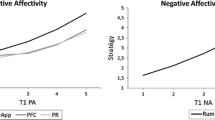Abstract
Recent social psychological research has indicated that merely thinking about some object will, under certain conditions, result in more intensified feelings (attitude polarization) toward that object. Implications of a selfgenerated attitude change model were tested for therapeutic interventions concerning phobias, particularly fear of public speaking. Subjects, who had previously indicated that they had a strong fear of public speaking, were exposed to one of three treatment conditions: Process Constraints condition, in which subjects were asked to make their beliefs and the derivations of those beliefs about public speaking explicit; Catharsis condition, in which subjects thought in an unconstrained manner about public speaking; and a Control condition. Relative to control subjects, subjects in the Process Constraints condition were expected to show reduced affect, whereas those in the Catharsis condition were expected to show increased affect. Results supported these hypotheses on self-report and physiological measures, but not on behavioral ratings. Implications of these results for therapeutic intervention, particularly Ellis's RET, were discussed.
Similar content being viewed by others
Reference Note
Taylor, D. A., & Altman, I. Intimacy-scaled stimuli for use in research on interpersonal exchange (Technical Report No. 9, MF022.01.03-1002). Bethesda, Maryland: Naval Medical Research Institute, May 1966.
References
Beck, A. T.Cognitive therapy and the emotional disorders. New York: International Universities Press, 1976.
Ellis, A.Reason and emotion in psychotherapy. New York: Lyle Stuart, 1962.
Festinger, L. A theory of social comparison processes.Human Relations 1954,7 117–140.
Geer, J. H. The development of a scale to measure fear.Behaviour Research and Therapy 1965,3 45–53.
Karst, T. O., & Trexler, L. D. Initial study using fixed-role and rational-emotive therapy in treating public-speaking anxiety.Journal of Consulting and Clinical Psychology 1970,34 360–366.
McNair, D. M., Droppleman, L. F., & Pillard, R. C. Differential sensitivity of two palmar sweat measures.Psychophysiology 1967,3 280–284.
Meichenbaum, D. By way of introduction.Cognitive-Behavior Modification 1975,1 1–2.
Meichenbaum, D. H., Gilmore, J. B., & Fedoravicius, A. Group insight versus group desensitization in treating speech anxiety.Journal of Consulting and Clinical Psychology 1971,36 410–421.
Newcomb, T. M. Autistic hostility and social reality.Human Relations 1947,1 69–86.
Orne, M. T. On the social psychology of the psychological experiment: With particular reference to demand characteristics and their implications.American Psychologist 1962,17 776–783.
Paul, G. L.Insight versus desensitization in psychotherapy. Stanford, California: Stanford University Press, 1966.
Tesser, A. Thought and reality constraints as determinants of attitude polarization.Journal of Research in Personality 1976,10 183–194.
Tesser, A. Self-generated attitude change. In L. Berkowitz (Ed.),Advances in experimental social psychology (Vol. II). In press.
Tesser, A., & Cowan, C. L. Some effects of thought and number of cognitions on attitude change.Social Behavior and Personality 1975,3 165–173.
Tesser, A., & Cowan, C. L. Some attitudinal and cognitive consequences of thought.Journal of Research in Personality 1977,11 216–226.
Trexler, L. D., & Karst, T. O. Rational-emotive therapy, placebo, and no-treatment effects of public-speaking anxiety.Journal of Abnormal Psychology 1972,79 60–67.
Author information
Authors and Affiliations
Additional information
We gratefully acknowledge George Muse for his seminal suggestions regarding the potential applicability of the work on self-generated attitude change to psychotherapy. We are also grateful to Patricia Kent for serving as the first experimenter. This research was supported in part by grants from the National Science Foundation (SOC 74-13925) and the National Institute of Mental Health (MH-05802-01) to Abraham Tesser.
Rights and permissions
About this article
Cite this article
Tesser, A., Leone, C. & Clary, E.G. Affect control: Process Constraints versus Catharsis. Cogn Ther Res 2, 265–274 (1978). https://doi.org/10.1007/BF01185788
Issue Date:
DOI: https://doi.org/10.1007/BF01185788




